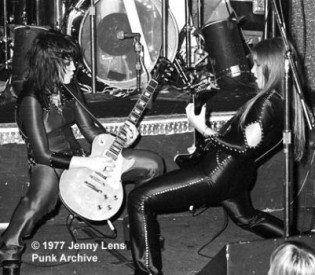The Runaways Author Evelyn McDonnell On Her New Book, “Queens Of Noise”, Band’s Legacy and More!

At first glance, the story of the Runaways is ridiculously simple, sexy 70s teenage girls +kickass rock and roll =instant pop culture memory burn. However, as anyone who’s researched the band is aware, the brief, but glorious period of time the band burned is not only fairly complicated but also just the tip of the iceberg. The Runaways story continued to spin and change like an elaborate game of “Telephone” through the 80s solo success of Lita Ford and Joan Jett. It was retold again through the resurgent girl rock era of the 90s, through Cherie Currie’s book “Neon Angel” and films like ex bassist Victory Tischler Blue’s “Edgeplay” and 2010’s “The Runaways”. Still, it seemed that, for as many questions those projects answered, twice as many popped up, enough to warrant a serious biography by author Evelyn McDonnell. Evelyn has added another voice to the chorus of Runaways storytellers with her excellent and well-researched book, “Queens Of Noise, The Real Story Of The Runaways” and I was happy to talk with her about it, read on…
Legendary Rock Interviews : Thanks so much for talking with us Evelyn…this book obviously took up a huge chunk of your life and the Runaways story means a great deal to you. When did the concept begin to take hold and can you convey just how many forks in the road or obstacles you faced in completing “Queens of Noise, The Real Story of The Runaways”?
Evelyn McDonnell: “Queens of Noise” began as my Master’s thesis at USC. I’d been interested in the Runaways for years, and when I got the Annenberg Fellowship to study at USC, I realized I would be in the perfect locale to write about them After talking with my advisor, the Pulitzer Prize winning writer Tim Page, I decided to hone in on Sandy’s story for my thesis. Tim and I had both seen Edgeplay and were blown away by Sandy’s presence in that film. What I didn’t realize at first was that The Runaways movie was finally happening. Kenny had been talking about it for years, and I had begun to wonder what he was smoking – haha. That timing wound up working out well, as I was able to sell my thesis to the LA Weekly before it was even done, and having the Weekly assignment helped me get interviews. Once the thesis was done, I knew that I needed to do the book. I spent the following summer writing the book proposal and my agent shopped it around. We had a deal by fall.
Once I had the contract, I had to make sure I was going to be able to find and interview enough of the principals. Some people took convincing, a few I never convinced, and a couple I never found. But mostly, people were very helpful and glad the story was being told in its entirety, by an objective source.

Purchase Evelyn’s book if you’re a rock and roll fan
LRI: I have interviewed lots of the participants in your book, most recently Cherie, whom I found to be very nice but not at all the victim she’s portrayed to be at times in film or even sometimes in her own book. Lets start with Cherie, the band existed before her and it existed after her. Still, she is obviously a huge player in any document/ story of the “fabulous five”, how did you approach telling her story without rehashing “Neon Angel”???
Evelyn: That’s funny and perceptive: I’ve been thinking just the same thing about Cherie. I’m not sure why her stories have been such victim narratives, because she is clearly a very strong woman, and in fact has carried a lot of the burden of keeping and telling the Runaways story. Perhaps, victimization was an easy narrative thread, and her cowriters led her down it. Also, I suspect she’s in a better place right now than ever, having struck out on her own. That’s a tremendous story of empowerment in itself.
Cherie did not cooperate with the book, which is partly why I’m not sure about the answer to your question. I interviewed her twice for the thesis and then not again. That was disappointing, but since her story had been told already, I knew I would be able to tell her part in my book. Also, in a sense, I needed to pull away from the fact that her story had dominated the histories of the Runaways, not because it’s not true, but because it’s just one piece of this Rashomon puzzle.

Vintage Cherie Currie photo by Brad Elterman
LRI: I am most satisfied with the emphasis placed on telling the story of every woman who was ever a Runaway including people like Laurie McCallister, Michael Steele and of course Victory Blue.
Did you sometimes find some of the most interesting or unreported information from some of those women’s stories?
Evelyn: I wish I had found Laurie before she died, and I wish I had gotten through to Michael. Vicki was very helpful, and obviously, as the maker of Edgeplay, has a lot of information. People like Danielle Faye and Peggy Foster were able to offer perspectives that hadn’t been told as well. The Runaways were more than the sum of their parts, and their parts were plenty!

The “Fabulous Five” Lita, Cherie, Joan,Jackie and Sandy
Q. That detail is what makes the book amazing. I was kept on the phone for four hours with Kim Fowley who is easily one of your most riveting chapters but you also tell the story of the label people, publishers, road managers and other peripheral characters. It was especially interesting that you also spoke with Toby Mamis. Were there any players in the story you just couldn’t nail down for an interview?
Evelyn: I never found (infamous tour manager) Scott Anderson and Denny Rosencrantz wouldn’t talk.
LRI: You paint the picture of the many pratfalls in their career without really blaming any one person which seems plausible. Still…do you think Kim’s biggest mistake was not hiring a better tour manager and road crew or is it just wayyy more complicated than that?
Evelyn: I don’t think any one thing went wrong so there was no single BandAid (so to speak). But certainly, better management could have made the story much less damaging for the girls. I’m not sure that was ever in the toolkit for Kim.

Japanese tour memories, photo from Runaways Fan Club on Facebook
LRI: “Edgeplay” blew me away rather than leaving me unsatisfied and mildly angry like “The Runaways”. How much did those two films influence you or change the way you previously saw the band?
Evelyn: As I said earlier, Edgeplay inspired and influenced me. Obviously, it revealed stories I had never heard before. But mostly, all of the women are so compelling in it. And of course, it has some big holes – like no Joan Jett. I was already pretty far in my research when The Runaways came out, and therefore very aware how much of the band’s story was missing. That said, I appreciate some of the deep truths about women and rock that (2010’s “The Runaways” director) Floria ( Sigismondi) conveyed.

Rare and brief lineup of Jett, West, Currie, Blue and Ford captured by Barry Levine
LRI: Jackie is painted often in the book as being an outsider in terms of her relationships with her bandmates for various reasons. Do you think that Jackie could have stayed in the band much longer had she had a closer ally in band or management?
Evelyn: No, not really. She was never in a band again; I don’t think she was cut out for it. It wasn’t her relationship with management, but with the other members, that alienated her from the band.

Runaways Japanese tour advertisement (featuring opening guest Barbi Benton), again from The Runaways Fan Club Facebook page
LRI: Lita and Joan are described as having a copacetic working relationship back in the 70s but for whatever reason the two have not been together in public much since. Do you sense anything other than ambivalence or is there some deep rooted reason why there is this chasm between the two bonafide rock star Runaways?
Evelyn: Another excellent question! I’ve wondered about this too, because they both generally say nice things about each other, at least to me. I don’t think it’s any secret that Lita does not like Kenny Laguna. I think Joan was very hurt when Sandy and Lita pulled away from her together. Kenny became Joan’s protector at that time; maybe there are still resentments, or suspicions, from that period. Because during the Runaways, Joan and Lita seemed to get along. I also think there was some competition in the 1980s, when both Joan and Lita had surging solo careers.

Joan Jett, Vicki Blue and Lita Ford on tour in Europe
LRI: Sandy’s been described as the heart and soul of the Runaways and her story is easily the most complicated of five fairly complicated personalities. How do you walk the line between telling the painful truth and not upsetting any friends or family in regards to the late Ms.West??
Evelyn: That was really hard to do. Sandy seemed like a great person who did some awful things. I was very driven to tell this tragedy about the incredible bravery and strength she had as a young woman, and how that got twisted by what happened to the Runaways. That seemed really important, but I also didn’t want to hurt her mother and sisters and friends. So I really tried to emphasize the good stuff: Her challenging her school to let her play drums, winning at the Rock’n’Roll Sports Competition, being a great musician and good friend. And I tried not to sensationalize the drugs and crime. The facts were pretty sensational enough; I tried to just say what had happened.

This, like all of our Runaways interviews, goes out to the late, great Sandy West, photo by Kasper Vogelzang
LRI: Thanks again for letting us interview you Evelyn. The book doesn’t underestimate its audience and there are moments where your professorial roots are showing in your verbiage or storytelling. There is also a great and understandable feminist narrative to be told. I think one of the most interesting and impressive things about the band is their ability to sway the opinions and viewpoints and curry the favor of male fans AND rock journalists today versus the uphill battles and insane sexism they faced in the 70s. What are your thoughts on that?
Evelyn: The most gratifying thing about the positive reception the book is getting is when people say, in the New York Times’s words, that I have “rightly rehabilitated a pioneering band’s reputation,” and “Anyone doubting the Runaways’ musical merits has only to hear their hard-hitting album “Live in Japan” to be enlightened.” If I have helped people hear and appreciate the Runaways, I’ve done my job. I have found that once you lead people to this water, they will lap it up.
Purchase Evelyn’s kickass Runaways book “Queens Of Noise” at Amazon http://www.amazon.com/Queens-Noise-Real-Story-Runaways/dp/0306820390?tag=ap0a7eddd0-by_exp-20
Category: Interviews
Comments (3)
Trackback URL | Comments RSS Feed
Sites That Link to this Post
- Legendary Rock Interview! | Populism | October 9, 2013




Unsurprising that Scott Anderson couldn’t be located; he died approximately 3-4 years ago, of cancer.
Hi Marie,
Thanks for that information. I had been told that but I have not been able to officially confirm it, and therefore can not report it. If you have a way to confirm it (obituary, death notice, family member, etc.), or know where he died so I could try to locate a death certificate, that would be much appreciated.
Thanks, Evelyn